- Home
- John Barth
The Floating Opera Page 2
The Floating Opera Read online
Page 2
I opened my eyes and bottle, then, and took a good pull, shook all over from head to toe, and looked at my room. It was a sunny morning, and though my window faces west, enough light reflected in to make the room bright. A pity: the Dorset Hotel was built in the early eighteen hundreds, and my room, like many an elder lady, looks its best in a subdued light. Then, as now, the one window was dappled with little rings of dust from dried raindrops; the light-green plaster walls were filigreed with ancient cracks like a relief map of the Dorchester marshes; an empty beef-stew can, my ashtray, was overflowing butts (I smoked cigarettes then) onto my writing desk—a bizarre item provided by the management; the notes for my Inquiry, then in its seventh year of preparation, filled a mere three peach baskets and one corrugated box with MORTON’S MARVELOUS TOMATOES printed on the end. One wall was partially covered, as it is yet, by a Coast & Geodetic Survey map of Dorchester County—not so annotated as it is now. On another hung an amateur oil painting of what appeared to be a blind man’s conception of fourteen whistling swan landing simultaneously in the Atlantic during a half-gale. I don’t recall now how I came by it, but I know I let it hang through inertia. In fact, it’s still over there on the wall, but once while drunk my friend Harrison Mack, the pickle magnate, drew a kind of nude on top of it in crayon. All over the floor (then, not now) were spread the blueprints of a boat that I was building at the time in a garage down by the range lights on the creek; I’d brought the prints up to do some work on them the day before.
It seems to me that any arrangement of things at all is an order. If you agree, it follows that my room was as orderly as any room can be, even though the order was an unusual one.
Don’t get the impression that my life, then or now, is “bohemian” or “left bank.” If I understand those terms correctly, it isn’t. In the first place, by 1937 I wasn’t enthusiastic about any kind of art, although I was and am mildly curious about it. Neither was my room dirty or uncomfortable—just crowded. It was probably the day before the maids came to clean: they spoil my orderliness by putting things “straight”—that is, out of sight. Finally, I live too well to be called a bohemian. Sherbrook rye costs $4.49 a quart, and I use a lot of quarts.
So. It’s really a quite adequate room, and I’m still here. I woke up that morning, then, slugged my rye, looked around my room, got quietly out of bed, and dressed for the office. I even remember my clothes, though that date—the 21st or 22nd—escapes me, after sixteen years of remembering: I wore a gray-and-white seersucker suit, a tan linen sports shirt, some necktie or other, tan stockings, and my straw boater. I’m sure I splashed cold water on my face, rinsed my mouth out, wiped my reading glasses with toilet paper, rubbed my chin to persuade myself that I didn’t need shaving, and patted my hair down in lieu of combing it—sure, because I’ve done these things, in that order, nearly every morning since perhaps 1930, when I moved into the hotel. It was at some moment during the performance of this ritual—the instant when the cold water met my face seems a probable one—that all things in heaven and earth came clear to me, and I realized that this day I would make my last; I would destroy myself on this day.
I stood erect and grinned at my dripping face in the mirror.
“Of course!”
Exhilaration! A choked snicker escaped me.
“For crying out loud!”
Momentous day! Inspiration, to have closed my eyes on the old problem; to have opened them on the new and last and only solution!
Suicide!
I tiptoed from the room to join my colleagues in the hall, the charter members of the Dorchester Explorers’ Club, for coffee.
Like the hotels of many small towns, the Dorset is bigger than it need be. Most of its fifty-four rooms are empty in the wintertime, and even with the addition of the several all-summer visitors who move in when the weather warms, there are enough rooms left empty on an average night to accommodate any traveling circus or muskrat-trappers’ convention that might come through town unexpectedly. The owners are able to stay in business, one might guess, only because the building was paid for several generations ago, and willed to the present operators unencumbered; because overhead and maintenance costs are very low; and because a number of elderly ladies and gentlemen unfortunate enough to have outlived their welcome in this world are forced by circumstances to make the hotel their last stopover on the road to the next. These supernumeraries, especially the men among them, comprise the Dorchester Explorers’ Club—meetings every morning from 6:15 until 6:45. The D.E.C., founded and named by myself, is still extant, though of the charter members only I remain alive.
That morning, as I remember, just two others were present: Capt. Osborn Jones, an eighty-three-year-old retired oyster dredger crippled by arthritis, and Mister Haecker, seventy-nine, former principal of the high school, then pensioned and, though in good health, devoid of family—the end of his line. Because Capt. Osborn had difficulty with stairs, we met in his room, on the same floor as mine.
“Morning, Cap’n Osborn,” I said, and the old man grunted, as was his habit. He was dressed in a shiny gray cap, a nondescript black wool sweater, and blue denims washed nearly to whiteness.
“Morning, Mister Haecker,” I said. Mister Haecker wore his usual spotless and creaseless black serge, a silk necktie, and a clean if somewhat threadbare striped shirt.
“Good morning, Todd,” he answered. I remember he was lighting his first cigar of the morning with one hand and stirring coffee with the other. I had purchased a one-burner hot plate for the Club some months before, and by mutual consent it remained in Capt. Osborn’s room. “Good and hot,” he said, handing me a cup of coffee.
I thanked him. Capt. Osborn commenced swearing steadily, in a monotone, and striking his right leg with his cane. Mister Haecker and I watched him while we sipped our coffee.
“Can’t wake her up, huh?” I offered. Every morning, as soon as Capt. Osborn dressed and sat down, his leg went to sleep, and he pounded it until the blood circulated. Some mornings it took longer than others to get the job done.
“Drink your coffee, Captain,” Mister Haecker said in his very mild voice. “It will do more good than all your temper.”
Capt. Osborn grew dizzy from the exertion; I saw him grip his chair arms to steady himself. He sighed, between clenched teeth, and took the coffee that Mister Haecker held out to him, grunting his thanks. Then, without a word, he deliberately poured the steaming stuff all over the delinquent leg.
“Hey there!” Mister Haecker exclaimed with a frown, for such displays annoyed him. I, too, was startled, afraid the coffee would scald the old fellow, but he grinned and struck once more at the leg with his cane.
“Smack her good,” I urged admiringly.
Capt. Osborn gave up the struggle and settled back in his chair, coffee still steaming and dripping from his trouser leg onto the floor.
“Awright,” he said, breathing heavily, “awright. I’m goin’ to die. But I want to do it all at once, not a piece at a time.” He regarded the leg with disgust. “God damn leg.” He kicked his right foot with his left. “Pins and needles, feels like. One time I could buck and wing with that leg. Even steered my boat with ’er, standin’ on the other and holdin’ a donkey rope in each hand! No more, sir.”
“Wouldn’t be so bad if he’d die in installments,” I said to Mister Haecker, who was fixing the Captain another cup of coffee. “Maybe the undertaker’ll bury him a piece at a time, and we can pay him a little each month.”
This about Capt. Osborn’s senility was a running joke in the Explorers’ Club, and as a rule Mister Haecker, for all his primness, joined in the bantering, but this morning he seemed preoccupied.
“You are going to die, Captain,” he said solemnly, giving Capt. Osborn the fresh coffee, “just as Todd says. But not for a spell, we trust. In the meantime you’re an old man, same as I. Just old age, is all. Why buck it? There’s not a thing in this world you can do about it.”
“Ain’t nothing I can do ab
out it,” Capt. Osborn admitted, “but I ain’t got to like it.”
“Why not?” Mister Haecker pressed. “That’s just what I want to know.”
“Why’n hell should I?” Capt. Osborn snorted. “Can’t work and can’t play. Jest spit tobacco and die. You take it; I don’t want it.” He drew a handkerchief from his sweater pocket and blew his nose violently. The cushions of his chair, the drawers of his table, the pockets of his sweater and trousers—all were stuffed with damp or drying handkerchiefs: the Captain, like many watermen, suffered from acute sinusitis, aggravated by the damp air of Dorchester County, and would have nothing to do with doctors. His only therapy was the half-tumblerful of Sherbrook that I gave him every morning before I left the hotel. It kept him mildly drunk until near noon, by which time his sinuses were less congested.
“Well,” Mister Haecker said, “wise men have never run down old age. Let me read you a quote I copied down from a book yesterday, just to read you.”
“Oh, my. Oh, my.”
“He’s going to convert you, Cap’n Osborn,” I warned.
“Hee, hee!” the old man chuckled. He always thought it tremendously funny when I suggested that he was a backslider.
“No,” Mister Haecker said, spreading open a folded strip of paper and holding it to the light. “This is something I copied down from Cicero, and I want you to hear what Cicero says about being old. Here’s what Cicero says, now: ‘… if some god should grant me to renew my childhood from my present age, and once more to be crying in my cradle, I should firmly refuse…’ There, now. I guess Cicero ought to know. Eh?”
“I expect so,” Capt. Osborn said, not daring to contradict flatly the written word.
“Well, now,” Mister Haecker smiled. “Then I say let’s make the most of it. How does it go? The last of life, for which the first was made. Don’t you think so?” He looked to me, for support. “Don’t you think so?”
“Don’t ask me, Mister Haecker; I’m still in the first.”
“Listen,” Capt. Osborn said, in that tone employed by old men to suggest that, having indulged long enough the nonsense of others’ opinions, they are about to get down to the truth. “Ye see this here arm?” He held out his bony right arm. “Well, sir, they could tie me to a cottonwood tree this minute, and hitch a team to this here arm, and they could pull ’er out slow by the roots, God damn ’em, and I’d let ’em, if they’d make me forty again, with a season’s pay in my pocket and all summer to live. Now, then!”
He sat back exhausted in his chair, but his face was triumphant.
“Do you think that’s right?” Mister Haecker pleaded to me. “Is that the way you’d feel?”
“Nope,” I said. Mister Haecker brightened considerably, but Capt. Osborn glared.
“Ye mean ye’d spend yer time readin’ nonsense to yerself?” he asked incredulously.
“Nope,” I said. Now Mister Haecker seemed disappointed too.
“Well, what’s your opinion about it?” he asked glumly. “Or don’t you have one?”
“Him!” Capt. Osborn snuffled with laughter and phlegm. “That one’s got opinions on ever’thing!”
“Oh, I’ve got one,” I admitted. “Matter of fact, I woke up with it this morning.”
“Woke up with it, did ye!” Capt. Osborn cackled. “I bet it’s a hot one, now!”
Mister Haecker waited patiently, though without much relish, to hear my opinion, but he was spared it, because Capt. Osborn’s laughter turned into coughing and choking, as it sometimes did, and the two of us had to clap him on the back until, still sputtering, he caught his breath. As soon as he could breathe normally again, I left the club meeting to fetch him his glass of rye from my room, for it seemed to me he needed his medicine badly.
Light step! I wanted to dance across the hall! My opinion? My opinion? S U I C I D E ! Oh, light step, reader! Let me tell you: my whole life, at least a great part of it, has been directed toward the solution of a problem, or mastery of a fact. It is a matter of attitudes, of stances—of masks, if you wish, though the term has a pejorativeness that I won’t accept. During my life I’ve assumed four or five such stances, based on certain conclusions, for I tend, I’m afraid, to attribute to abstract ideas a life-or-death significance. Each stance, it seemed to me at the time, represented the answer to my dilemma, the mastery of my fact; but always something would happen to demonstrate its inadequacy, or else the stance would simply lose its persuasiveness, imperceptibly, until suddenly it didn’t work—quantitative change, as Marx has it, suddenly becoming qualitative change—and then I had the job to face again of changing masks: a slow and, for me, painful process, if often an involuntary one. Be content, if you please, with understanding that during several years prior to 1937 I had employed a stance that, I thought, represented a real and permanent solution to my problem; that during the first half of 1937 that stance had been losing its effectiveness; that during the night of June 20, the night before the day of my story, I became totally and forcibly aware of its inadequacy—I was, in fact, back where I’d started in 1919; and that, finally and miraculously, after no more than an hour’s predawn sleep, I awoke, splashed cold water on my face, and realized that I had the real, the final, the unassailable answer; the last possible word; the stance to end all stances. If it hadn’t been necessary to tiptoe and whisper, I’d have danced a trepak and sung a come-all-ye! Didn’t I tell you I’d pull no punches? That my answers were yours? Suicide! Poor Mister Haecker, he must wait to learn my opinion (wait, wretched soul, I fear, for Judgment Day), but not you, reader. Suicide was my answer; my answer was suicide. You’ll not appreciate it before I’ve laid open the problem; and lay it open I shall, a piece at a time, after my fashion—which, remember, is not unsystematic, but simply coherent in terms of my own, perhaps unorthodox, system.
Then, for heaven’s sake, what is my system? Patience, friend; it’s not my aim to mystify or exasperate you. Remember that I’m a novice at storytelling—even if I weren’t, I’d do things my own way. I suggest you substitute this question for yours: Why didn’t I carry Capt. Osborn’s rye with me when I first left my room, so that I shouldn’t need to return for it? There’s a more specific question, and a more reasonable, and a less prying, and its answer involves the answer to the other. I didn’t take the rye with me in the first place because it wasn’t my habit to do so, and one of the results of my eye-opening answer was that this day—this June 21 (I’m almost certain)—should, because of its very momentousness, be lived as exactly like every other day of my recent life as I could possibly live it. Therefore, although I knew very well that Capt. Osborn would need his medicine, I left it in my room and returned for it after coffee, as was my practice.
Is this an answer? More to the first question than to the second; you still don’t know how the practice originated, any more than I do, but you know that my system for living this extraordinary day was to live it as ordinarily as possible, though every action would necessarily be charged with a new significance. And similarly, my method in telling this story will be to set down the events of that day as barely as possible, for I know that in the telling I’ll lose the path often enough for you to learn or guess the whole history of the question, as the audience to my untethered showboat pieces together the plot of their melodrama—and I swear by all the ripe tomatoes in Dorchester that when the excitement commences, the boat will be floating just in front of you and you shan’t miss a thing.
So, then. I crossed the hall to my room, opened the door softly, and tiptoed inside to fetch the glass of rye. My intention was to rinse the drinking glass out, fill it half full, and leave as quickly as possible, but as soon as I turned the faucet at the washbasin, and it sounded its usual A♭ above high C, Jane Mack opened her marvelous green eyes and sat up in my bed: her hair, brown and sleek as a sable’s, fell around her shoulders, and the bed sheet slid to her hips; she raised her right arm to push the hair back; the movement flattened her stomach and lifted one of her breasts in a way that f
lexed my thighs to watch. I was still holding the quart of Sherbrook in my right hand and the glass in my left. Jane asked me, in a sleepy voice, whether it was eight o’clock yet; I told her it was not. She scratched her head, yawned, flopped back on the pillow, sighed, and, I think, went to sleep again instantly. The sheet was still at her hips, and she lay with her back to me. I believe that a small warm breeze was moving through the room, and I remember clearly that a little ray of sunlight reflected from something outside and streaked brilliant across the sun-browned skin of her, where her waist grew smallest above the round angle of her hip, thrust up by the hard mattress of my bed. I drank Capt. Osborn’s medicine myself, as was not my practice, poured him another dose, and tiptoed out.
III. coitus
If you’re still with me, I shan’t even bother explaining why I couldn’t tell you that Jane Mack was my mistress until after I’d announced that this day was a momentous one; either you’re familiar with the business of climaxes and anticlimaxes, in which case no explanation is necessary, or else you know even less about storytelling than I do, in which case an explanation would be useless. She was, indeed, my mistress, and a fine one. To make the triangle equilateral, Harrison Mack was my excellent friend, and I his. Each of the three of us loved the other two as thoroughly as each was able, and in the case of Jane and Harrison, that was thoroughly indeed. As for me—well, I’ll explain in a later chapter. And Harrison was quite aware of the fact that between 1932 and 1937 his wife spent many, many hours in my room and in my bed. If he didn’t know that I had made love to her exactly six hundred seventy-three times, it’s because Jane neglected to keep score as accurately as I did.
I’ll explain it now: it’s a good yarn, and Capt. Osborn can wait a chapter for his rye.
I first met Harrison Mack in 1925, at a party given by a classmate of mine from the University of Maryland Law School. It was a drunken affair held somewhere in Guilford, a wealthy section of Baltimore. At the time, I shall explain, I was in the early throes of a spell of misanthropic hermitism, which lasted from 1925 until 1930. I had, for various reasons, renounced the world of human endeavors and delights, and although I continued my legal studies (principally through inertia), I was having no more to do with my fellow man and his values than I had to. Rather a saint, I was, during those five or six years—a Buddhist saint, of the Esoteric variety. It was one of my provisional answers to the peculiar question of my life, and long after I’d outgrown it I still remembered that stance with pleasure.

 Final Fridays
Final Fridays Where Three Roads Meet: Novellas
Where Three Roads Meet: Novellas Every Third Thought: A Novel in Five Seasons
Every Third Thought: A Novel in Five Seasons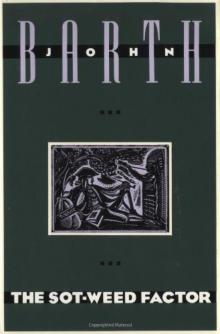 The Sot-Weed Factor
The Sot-Weed Factor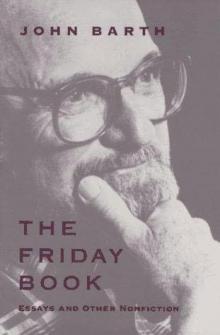 The Friday Book
The Friday Book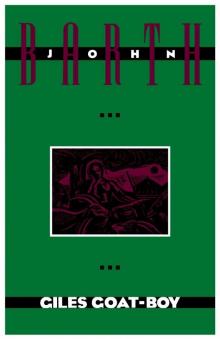 Giles Goat Boy
Giles Goat Boy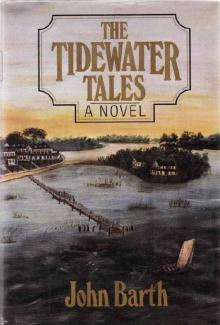 The Tidewater Tales
The Tidewater Tales The Development
The Development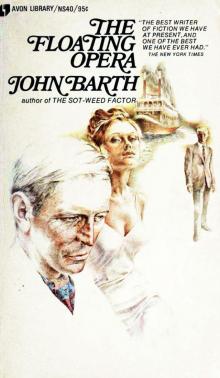 The Floating Opera
The Floating Opera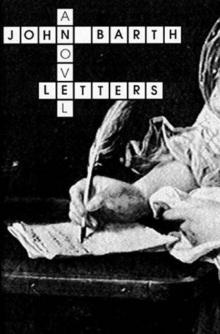 Letters
Letters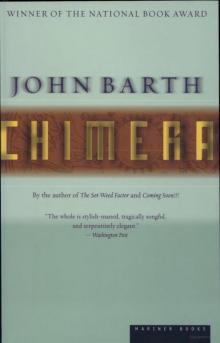 Chimera
Chimera Where Three Roads Meet
Where Three Roads Meet Every Third Thought
Every Third Thought